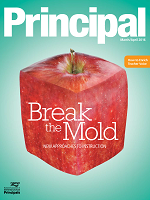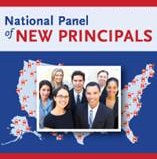
Best Practices: Instructional Leadership—Curriculum and Instruction
Webinars
 Improving Instruction to Enable Teachers to Teach at their Best and Students to Learn to their Utmost
Improving Instruction to Enable Teachers to Teach at their Best and Students to Learn to their Utmost
Presenters
Dwayne Young, Principal, Centreville Elementary School, Centreville, VA; and Deborah Tyler, Associate Executive Director, Professional Learning and Outreach, NAESP.
Description
Research has shown that the most impactful staff development to foster building the instructional capacity of educators is job embedded with frequent opportunities to revisit and adapt skills. In this webinar, our goal is to have principals share the steps and processes they have taken to ensure that teachers have optimal opportunities to hone their craft.
 What Is It About Me You Can’t Teach? — Reaching Every Child
What Is It About Me You Can’t Teach? — Reaching Every Child
Presenters
Diane Watkins, Director of Assessment and Accountability, Chesapeake Public Schools, VA; andStephanie Johnson, Coordinator of Educational Leadership Program, Hampton University, VA
Description
Though parents send us the best they have every day, schools are not comprised of perfect children. In this webinar we will explore what makes it so difficult to teach some children and discuss exciting new ideas for reaching every student’s potential.
 The Power of Building Capacity: Connecting Climate and Instruction for Improvement
The Power of Building Capacity: Connecting Climate and Instruction for Improvement
Presenter
Donna Snyder, Director of Early Childhood and Elementary Education, Arlington County Public Schools, VA
Description
This webinar will explore a comprehensive system for improvement that allows teachers, administrators, and districts to actively and reflectively respond to student outcomes in order to provide quality teaching and learning for all. Practical examples of one school’s journey from state sanctions to success will be showcased to help principals envision and plan for innovation in their own school.
 Academic Rigor and the Road to Exemplary
Academic Rigor and the Road to Exemplary
Presenter
Kathleen Sciarappa, NAESP Mentor Trainer and Coach, Rigor Workshop Speaker
Description
The NAESP Rigor seminar was developed with an eye toward providing information about rigor in the classroom, especially in light of the Common Core. We’ll discuss four aspects of rigor: 1) metacognition; 2) higher level thinking; 3) deep understanding; 4) solving problems then address specific teacher behaviors and student responses in order to help principals and teachers engage in discussions about integrating greater rigor into instruction. Academic rigor is more than a set of activities; it is focused on the belief that the primary role of schooling is to develop self-directed individuals who are self-reflective, self-modifying and self-managing. It entails teaching beyond knowledge and skills to a deeper understanding of concepts, generalizations and principles that sit at the heart of disciplines and are transferable within and across subjects. Participants will consider what changes can be instituted for students to achieve more in the classroom.
Articles from Principal Magazine
 Principal March/April 2016:
Principal March/April 2016:
“New Approaches to Instruction”

Validated Change
We have no shortage of ideas for improving instruction. The challenge is finding the right ideas, validating them, and taking them school- or systemwide.
—Justin Baeder
Scaling to the Top to Close the Gap
Special education and general education teachers teamed up to implement Marzano’s proficiency scales and improve student skills.
—Andrea J. Spas and Steven A. Morrone
A Maker Culture
Flexible makerspaces teach students to take risks, inspiring a deeper form of learning.
—Laura Fleming
Cultivating Creativity
Schoolwide collaboration and commitment leads to successfully integrating the arts.
—Susan B. Herrera
Tips for Effective Blended Learning
Five steps to help teachers reach the delicate balance of blended instruction.
—Amy E. Baeder
 Principal January/February 2015:
Principal January/February 2015:
“Literacy and Reading”

Diving In
Help students get to the bottom of close reading and complex texts.
—Douglas Fisher and Nancy Frey
When Old Becomes New
Bringing vocabulary instruction back into our schools.
—Aradhana Mudambi
Digital Native Does Not Equal Digital Literacy
By working together, principals, librarians, and teachers can transform learning environments to ensure that students achieve digital literacy.
—Ann M. Martin and Kathleen R. Roberts
New Arts + Literacy Standards = Opportunity
NAESP’s Gail Connelly discusses the intersection of arts-integration, college- and career-ready standards, and pre-K-3 with NAESP President Mark White and NAEA President Dennis Inhulsen.
Articles from Communicator
 Communicator August 2016:
Communicator August 2016:
“3 Ways to Connect & Innovate”

Stay ahead of the curve with these easy tips for becoming an innovative educator. Read more.
Communicator June 2016:
“Teacher Partnerships Reap Results”
New research on how teachers can learn from each other and build tangible skills. Read more.
Communicator March 2016:
“Personalized vs. Adaptive Learning”
Learn the difference between personalized and adaptive learning, and decide what’s best for your school. Read more.
 Communicator March 2016:
Communicator March 2016:
“6 Ideas to Encourage Reading”

Use these creative concepts from the National Panel of New Principals to inspire reading at your school. Read more.
Communicator February 2016:
“To Improve Reading, Start by Talking”
Stay ahead of the curve with these easy tips for becoming an innovative educator. Read moreRead more.
NAESP Conference Presentations
 Instructional Rounds: A Collaborative Process for Developing Teaching and Leadership Capacity
Instructional Rounds: A Collaborative Process for Developing Teaching and Leadership Capacity

Primary Presenter
Aaron R. Butler, PhD—Senior Consultant, American Institutes for Research
Description
Instructional rounds are an easy to implement process modeled after the medical profession where small groups of practitioners with varying levels of expertise, experience, and skill walk together to observe, discuss and learn. Instructional rounds offer a low-cost, high impact, sustainable learning process focused on improving instruction across the school.
 Put Me In, Coach! Transforming Teaching Practice—Instructional Coaching that Works!
Put Me In, Coach! Transforming Teaching Practice—Instructional Coaching that Works!

Primary Presenter
Mark Reardon, MA, Educational Administration — Chief Learning Officer, Quantum Learning Network
Description
Conducting professional conversations that stay focused and result in increased teacher effectiveness can be challenging. Put Me In, Coach! dynamically synthesizes cognitive coaching, cognitive psychology, neuroscience, and neurolinguistics into a practical model that deepens reflection, increases personal accountability, facilitates transfer of effective practices, and ensures high levels of implementation.
 SOS (Supporting Our Students) : Learn How to Support ALL Students with Targeted Instruction
SOS (Supporting Our Students) : Learn How to Support ALL Students with Targeted Instruction

Primary Presenter
Pam R. Dodge — Principal, Ankeny Community Schools
Co-Presentar
Amy J. Krause, Master’s Degree — Instructional Coach, Ankeny Community School District
Description
Transform the way your school operates to ensure high levels of learning for all students. Learn how one large Iowa elementary school individualizes instruction for 672 students. All students deserve targeted instruction delivered by the most highly qualified staff. Leverage your data, resources, teams, because all means all!